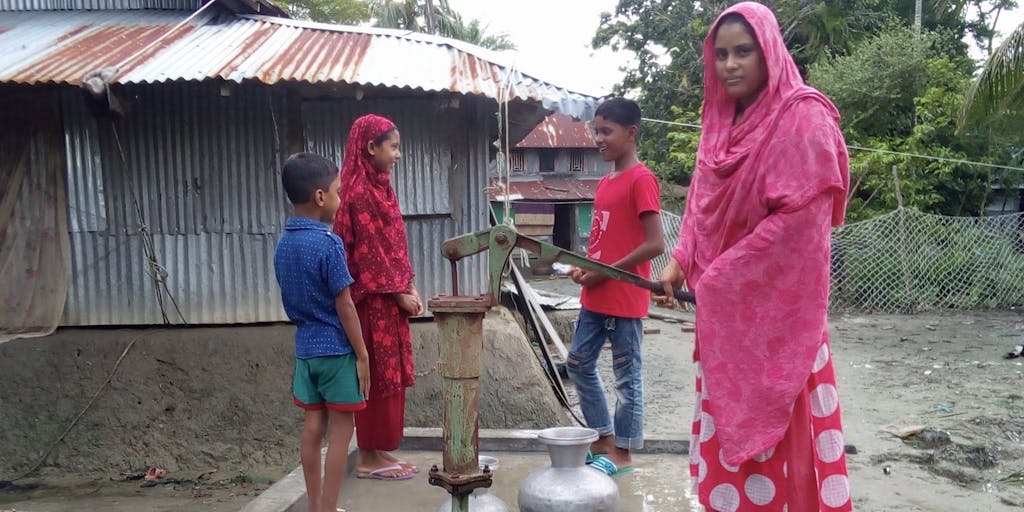At first glance, the coastal region of Taltoli, Bangladesh doesn’t seem like a place where it would be hard to find a well and sufficient water. Shallow ponds and pools of groundwater water surround the area, which is home to the largest mangrove forest in the world. In a humble fishing village here, situated near the delta of the Ganges River, is where twelve-year-old Shakibul and his family live.
Although the water pooling on the low-lying ground appears plentiful, it is a silent threat. Natural disasters like cyclones and tidal flooding have increased the salinity of the water to toxic levels in coastal towns like these. This, combined with run-off from raw sewage and poor sanitation practices, render them unsafe and, in many cases — deadly.
Water is Life
In Bangladesh, women bear the disproportionate burden of collecting this precious commodity for their families (nearly 90%). The search for potable water is a daily crisis that plagues the lives of the women here.
Shimul, Shakibun’s mother, is no exception. Every day, she faced the agonizing question of how she would gather clean water for her family to drink and cook with. In all places where existence must thrive– and especially in regions experiencing acute shortages – water is life.
An Arduous Journey to the Well
The nearest clean water well was distant; the journey fraught with difficulty.
“We struggled a lot to fetch safe drinking water, especially in drought season. We had to travel long distances which was very difficult,” Shimul explained.
Once she arrived, her heart would sink. The pump was often overcrowded with women just like her, adorned in their vibrant saris and waiting for sometimes hours under the unrelenting midday sun. Each carried a traditional aluminum water pot, heavy and cumbersome once full. So essential are these pots to life here, they are often given as wedding gifts.
Most women would need to make multiple trips to have enough water for their daily needs. This arduous trek would consume their entire day and they’d fall asleep each night with the distressing realization that they would need do it all over again the very next day.
 The Impossible Choice
The Impossible Choice
Shimul’s husband was often out looking for work and was of little help. After countless trips to the distant well, she began to experience back pain and couldn’t endure the journey any longer.
She tried to limit her children’s water intake to stretch their supply but eventually she succumbed to her only option; to gather water from the nearby contaminated ponds.
They drank.
Soon after, the illness came, striking viciously. Dysentery. Chronic diarrhea.
Because no one had explained why the water was dangerous, they kept drinking. “I had no idea why we were falling sick,” she recalled. “I had little money to buy medicine and get treatment. Instead of school, my children were in bed.”
They needed a tube well in their own village but could barely afford to meet their basic needs. Shimul lamented, “I was restless with worry. I thought, how can we solve this problem? How can we afford to set one up?”
Teaching and Transforming
Her answer soon came. Food for the Hungry (FH) began sponsorship activities in her village and Shakibul was enrolled. FH met with the most vulnerable families like Shimul and Shakibul’s to understand what their greatest needs were. A tube well was installed, and the villagers were invited to attend health trainings.
“[Before FH came], we were ignorant about health such as hygiene, child and maternal health and nutrition. Our children’s literacy rate was low. We didn’t know how to purify water,” she shared.
Shimul’s sentiment echoes the crux of FH’s work and vision, as we go to the hard places to help families realize their God-given potential. We know that in remote and poor villages like Shakibul and Shimul’s, if no one teaches them, how will they learn?
Restored Joy
Thanks to sponsorship funds, Shimul’s entire community not only understands how to stay healthy but has the resources to protect their families from life-threatening, waterborne illnesses. Her children can focus on their studies, not their sickness. She is able to save money through an FH community savings group for medicine and other essentials for her family.
And now, Shimul and her neighbor’s journey to clean water is measured in minutes, not miles.
Their quality of life has drastically improved to the point that they can together experience a once distant feeling: joy.

As one FH staff member noticed, there is a remarkable difference in the spirits of the women. “Because of the tube well, they can drink safe water easily. The children and women are very happy. Their smiles make us proud.”
Consider joining us as a monthly sponsor, or helping one family access a well, to bring pride and clean water to communities around the globe.
You May Enjoy Reading These
Handwashing: How Cambodians Fight COVID-19


